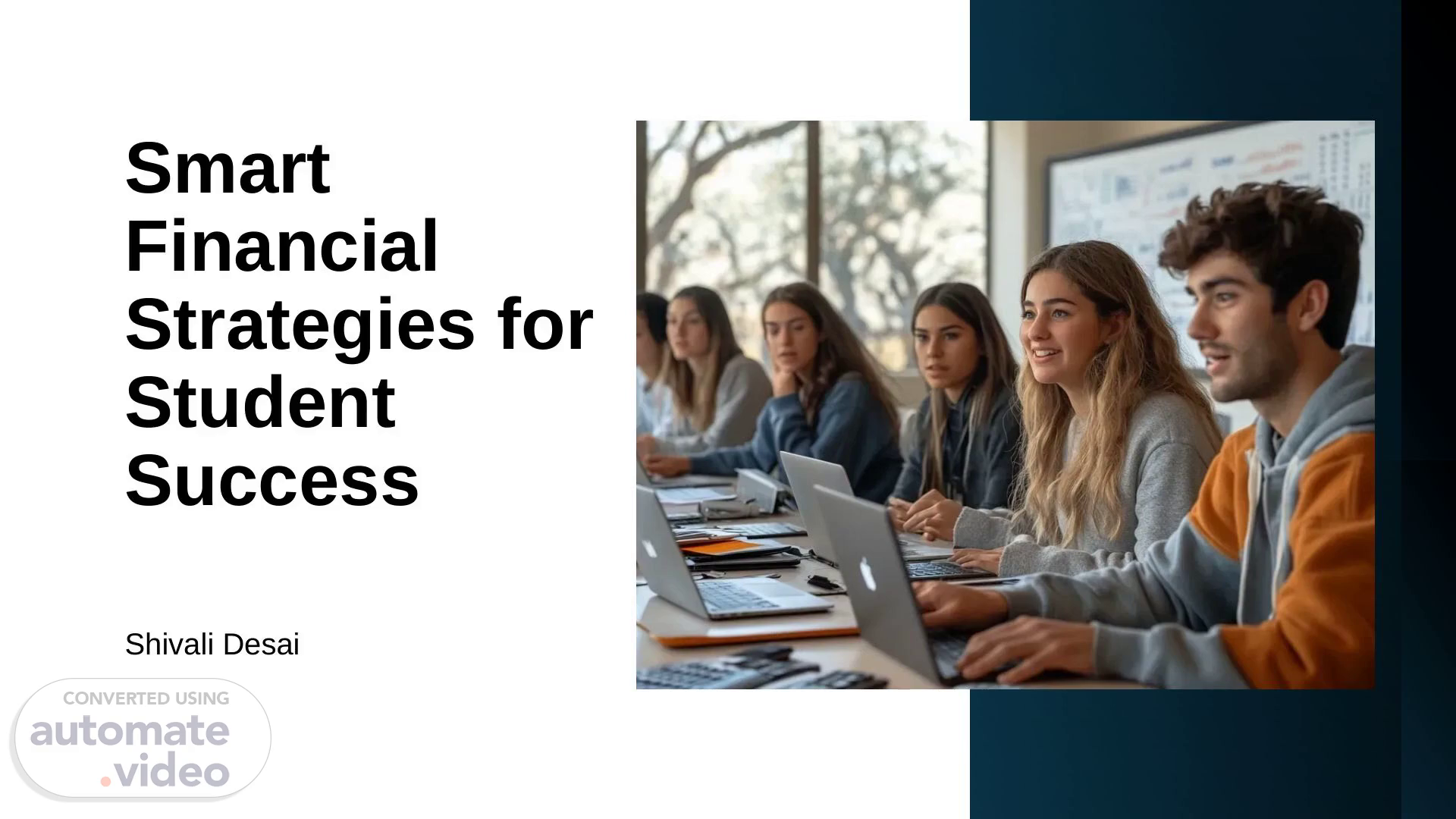Scene 1 (0s)
[Audio] Smart Financial Strategies for Student Success Shivali Desai.
Scene 2 (5s)
[Audio] Why Budgeting is Crucial for Students Financial Control: A budget allows you to clearly see how much money is coming in (income from part-time jobs, allowances, scholarships) and how much is going out (tuition, rent, food, et cetera). Reduces Stress: When you know your financial situation and plan ahead, there's less anxiety about running out of money or not being able to cover important expenses like textbooks or unexpected costs. Avoid Mistakes: Common mistakes include not tracking daily spending, overspending on nonessentials like eating out or entertainment, and not saving for emergencies such as medical expenses or last-minute travel needs. Limited Income: Most college students have a limited or fixed income, so budgeting helps maximize every dollar and avoid debt..
Scene 3 (1m 0s)
[Audio] Key Benefits of Budgeting Control Over Finances: You can make informed decisions about spending, ensuring you have enough for both your essentials (rent, groceries) and non-essentials (entertainment). Avoiding Debt: By sticking to a budget, you can minimize or avoid borrowing money through credit cards or student loans. Stress Reduction: Knowing exactly where your money is going brings peace of mind, especially when managing large expenses like tuition. Future Planning: Budgeting also helps set aside savings for long-term goals like a study abroad trip or post-graduation plans..
Scene 4 (1m 39s)
[Audio] Practical Budgeting Tools Apps for Expense Tracking Mint: A free app that connects to your bank accounts and automatically tracks your spending. It categorizes expenses and alerts you when you overspend in any category. Y-N-A-B (You Need a Budget): A paid app that follows the principle of giving every dollar a job. Great for planning ahead and building savings. Pocket Guard: Helps prevent overspending by showing you how much disposable income you have after essentials. Manual Tracking Excel or Google Sheets: If you prefer more control, manually entering your income and expenses into a spreadsheet can give a clearer view of your financial habits. Create simple formulas to track categories like rent, utilities, groceries, and entertainment. Customizable and great for students who like a hands-on approach..
Scene 5 (2m 34s)
[Audio] Budgeting Methods 50/30/20 Rule 50% Needs: Spend half of your income on essentials like rent, food, transportation, and utilities. 30% Wants: Allocate 30% for things you enjoy, such as dining out, entertainment, or new clothes. 20% Savings/Debt: The remaining 20% should go to savings or paying down any debts, like student loans. Example: If you earn $1000 per month, $500 goes to rent, $300 to social activities, and $200 to savings. Zero-Based Budgeting: Every dollar is assigned a job. At the end of the month, your total income minus your total expenses should equal zero. Encourages intentional spending since you must allocate funds to every category..
Scene 6 (3m 26s)
[Audio] Sticking to Your Budget Set Clear Financial Goals: Decide on specific goals, such as saving $500 for a vacation or buying a new laptop for school. Having a goal in mind makes it easier to stick to a budget. Track Progress Regularly: Set aside time each week to review your spending and ensure you're not exceeding your budget. Celebrate Small Wins: When you successfully stick to your budget for a month or meet your savings goal, reward yourself. This positive reinforcement can motivate you to stay on track. Avoid Impulse Purchases: Think before you buy. Ask yourself if you really need the item or if it fits into your budget..
Scene 7 (4m 9s)
[Audio] Common Pitfalls to Avoid Overspending on Non-Essentials: It's easy to justify a daily coffee or frequent takeout, but these small expenses add up quickly. Cut back on non-essential items to save more. Not Tracking Small Expenses: Small purchases, like snacks or bus rides, can often go untracked, but they affect your overall budget. Keep track of everything. No Emergency Fund: Life is unpredictable. Whether it's an unexpected medical bill or a broken laptop, having an emergency fund can keep you from going into debt. Aim to save at least $500 to $1000. Inconsistent Budget Reviews: It's essential to review and adjust your budget as your income and expenses change (for example, during a new semester)..
Scene 8 (5m 0s)
Budgeting.
Scene 9 (5m 5s)
[Audio] Final Tips Stay Consistent: is not a one-time activity. Regularly review your budget and make adjustments if needed. Consistency leads to success. Adjust as Needed: Your financial situation may change throughout the semester. Be flexible with your budget and update it if you get a part-time job, face increased tuition, or need more supplies. Keep Learning: New budgeting tools and methods are always being developed. Stay informed about the latest apps and financial strategies that could improve your budgeting habits..
Scene 10 (5m 39s)
[Audio] Conclusion Summarize the importance of creating a budget: Financial control, reduced stress, and long-term financial success. Encourage students to start small by tracking their expenses and gradually adopting a budgeting method that works best for them. Reiterate the message: Budgeting isn't just about cutting expenses—it's about making intentional choices to achieve financial goals while still enjoying life as a student..
